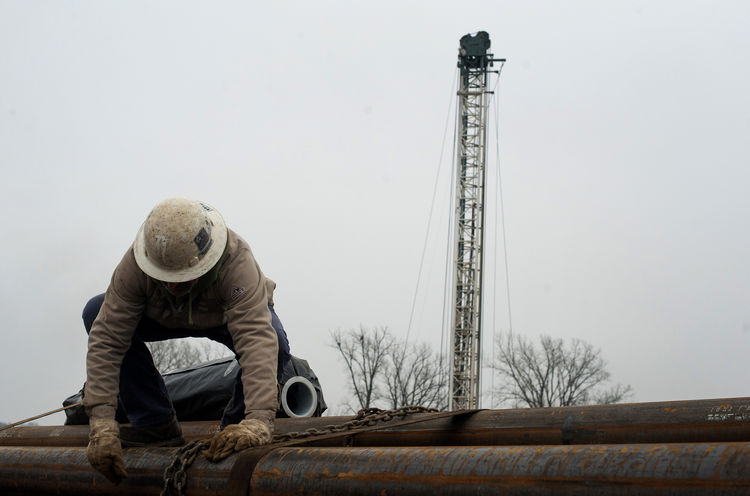- Oil Marketers Threaten Mass Sacking Over $2bn Debt
Oil marketers have said they will embark on mass retrenchment following the failure of the Federal Government to pay the debt owed them for importation of petroleum products as well as the accrued interest on loans from banks and exchange rate differential.
The marketers under the aegis of Major Oil Marketers Association of Nigeria, Independent Petroleum Marketers Association of Nigeria, Depot and Petroleum Products Marketers Association, and Independent Petroleum Products Importers said the debts had risen to over $2bn.
According to a joint communiqué issued after their meeting in Lagos on Tuesday and signed by their legal adviser, Patrick Etim, many marketers and oil companies owe workers over eight months’ salaries due to the inability of government to pay off their debts on products imported since 2015.
They urged the government to authorise the payment of outstanding interest and foreign exchange differentials owed them to save their business from total collapse.
The marketers said they owed some Nigerian banks over $2bn, which they took as loans to import fuel, adding that the interest had accumulated over time because the government had yet to pay them or pay the banks interest on the loans as agreed.
The communiqué said, “The hope that the outstanding debts owed marketers will be paid, resulting from the intervention of the Vice President, Prof. Yemi Osinbajo, appears to have been dashed as the payment that was promised to happen in July 2017 is yet to materialise.
“This was devastating to marketers as we are being dragged daily by banks on debts owed and under threat of putting our tank farms under receivership.”
The marketers said they expected that the various meetings held between senior government officials and the leadership of the oil dealers to resolve the issue of the outstanding debt would yield the desired result as the figures were fully reconciled and there was commitment from the government to pay by the end of July 2017.
“However, Nigerian banks that are carrying the indebtedness of the marketers on their balance sheet have had been disappointed because as it stands now the payment of all the debts by the Federal Government have not been received and this has resulted in a lot of problems between the banks and marketers.”
The communiqué stated that the government had entered into a contract with the marketers, mandating them to import and supply petrol to the market.
It said the condition of the contract was that the government would pay the difference between the landing cost and the selling price (as fixed by the government), provided that the landing cost was higher than the selling price.
The marketers said the government approved the landing cost, which fluctuated as it depended mainly on the international price of petrol and the exchange rate of naira to the dollar.
According to the communiqué, a key term of the government’s contract with the marketers is that the under-recovery payments shall be paid to marketers within 45 days of submission of documents evidencing discharge of petrol cargo and trucking out from storage.
It said, “It was also agreed that after 45 days, the government shall pay the interest charges on the loans taken by the marketers to finance the importation of cargoes of petrol.”
The marketers said they opened Letters of Credit at exchange rate of N197/$1 while petrol cargoes were supplied and sold at the selling prices approved by the government and the repayment was calculated using the above exchange rate.
They said, “The recent further devaluation of the naira from N195 to N305, and later to over N365 to $1, while the Federal Government agencies based their reimbursement calculation on N197 to $1, left petroleum marketers within our association with additional debt burden in excess of N600bn. This is in addition to the over N250bn arrears owed.”
According to the communiqué, the banks, in line with the Central Bank of Nigeria’s prudential guidelines, have classified the accounts of the marketers as non-performing, with properties provided by the marketers as securities for the funds in the process of being auctioned.
It said, “We have indeed made several spirited efforts to get the government agencies involved to pay up fully, adhering to the principle of ‘full restitution’ to all participants in the then PMS import scheme but the major challenge of the economy has impeded its complete success; hence, we are once more making a direct appeal for the intervention of Mr. President.”
“The banks are worried that financing new petrol imports when outstanding loans, interests and charges have not been paid will be foolish especially when it is clear that the imports will represent an unmitigated loss to the importers based on the landing costs.”

 Forex2 weeks ago
Forex2 weeks ago


 Naira2 weeks ago
Naira2 weeks ago
 Naira4 weeks ago
Naira4 weeks ago
 Company News4 weeks ago
Company News4 weeks ago
 Billionaire Watch1 week ago
Billionaire Watch1 week ago




 Naira2 weeks ago
Naira2 weeks ago




 Naira4 weeks ago
Naira4 weeks ago




 Naira1 week ago
Naira1 week ago






















